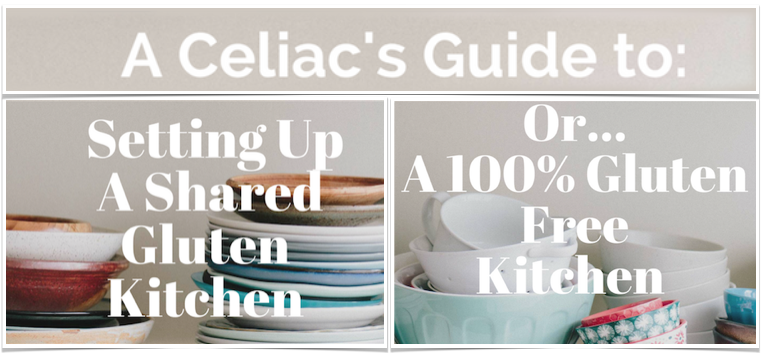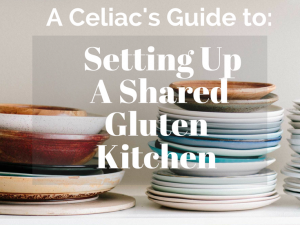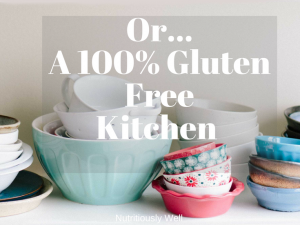Jump Start Your Health with Elizabeth Johnson, RHN
Should I Set Up A Shared Gluten Kitchen – or a 100% Gluten Free One?

Should I set up a shared kitchen or a 100% gluten-free kitchen?
Whether you’ve just been diagnosed with celiac disease or are on a gluten free diet and are still having symptoms, it’s time reassess your kitchen scenario and ask yourself a few questions. According to a study done by Beyond Celiac more then half of people with celiac disease share a kitchen to some extent. Remember this can vary between having more then half the food in your kitchen be gluten foods and having one box of regular gluten cookies stashed away. So when sharing a kitchen it varies substantially on how much of your kitchen is actually gluten free.
Questions to ask yourself when making the decision:
How many people am I sharing a kitchen with and what ages?
- The risk of gluten cross contamination is highest in a busy kitchen with young children. If this is your house and it’s possible, having a 100% gluten free kitchen is safest for you. If you’re sharing the kitchen with one other adult and they are very knowledgeable about your condition then having a shared kitchen is probably manageable.
How big is the kitchen? Will I have a space on the counter that can be dedicated gluten free?
- If you’re kitchen is very small and there isn’t space for a separate space on the counter then consider making the entire kitchen gluten free. It is possible to share a counter top but crumbs are sneaky.
How understanding are those that I live with?
- It’s important that whoever you’re sharing your house with that they are at least open to learning about the gluten free diet. If they are opposed to learning then having a 100% gluten free kitchen is what’s best for your health. It’s a learning curve for everyone involved, but it’s important that those in your household are open to learning what they need to know. If they’re understanding and willing to learn how to keep you safe then having a shared kitchen is a possibility.
 Shared Kitchen Top Tips:
Shared Kitchen Top Tips:
- Don’t have any gluten flours in your kitchen, not only does flour get everywhere, it’s very hard to clean.
- Have a separate part of the kitchen counter and cabinet for gluten foods, keep every where else strictly gluten free.
- Have the top shelf of your refrigerator be gluten free.
- Mark all of your gluten free foods (especially jars, condiments, butters, yogurts) with stickers to make sure they stay gluten free.
- If it’s been several months and you still feel ill consider switching to a 100% gluten free kitchen.
- Have all of your gluten free pots, pans, spoons and separate items be a different colour to make them easy to tell apart. All of my gluten free items are red to make it easy to tell them apart.
 100% Gluten Free Kitchen Top Tips:
100% Gluten Free Kitchen Top Tips:
- Throw away items that are opened that could be cross contaminated (like for example baking supplies like sugar and baking soda will most likely have been cross contaminated by double dipping measuring cups and spoons)
- Instead of throwing away gluten containing foods that are unopened donate them to a food bank.
- Be appreciative to those in your life. It will be hard for yourself and those you live with so try to keep it positive.
 Elizabeth Johnson, RHN is a Victoria Celiac and frequent contributor to The Celiac Scene. She shared her personal journey with celiac disease and professional expertise as a Registered Holistic Nutritionist in a series called ‘Jump Start Your Health with Elizabeth Johnson, RHN’ on such topics as
Elizabeth Johnson, RHN is a Victoria Celiac and frequent contributor to The Celiac Scene. She shared her personal journey with celiac disease and professional expertise as a Registered Holistic Nutritionist in a series called ‘Jump Start Your Health with Elizabeth Johnson, RHN’ on such topics as
- What’s the difference between Pre-biotics & Probiotics
- Everything you ever wanted to know about sprouting (gluten-free) seeds!
- Should I Set Up A Shared Gluten Kitchen – or a 100% Gluten Free One?
- Dairy-Free Sunbutter Chocolates – Just in Time for Easter!
- Sunbutter & Jelly Yogurt Breakfast Bowl Gluten-Free • Dairy-Free • Nut-Free • Allergy-Free
- Healthy Carrot Muffins – Allergy Free, Gluten Free, Dairy Free
 Elizabeth has just assumed a position with Vancouver Island Naturopathic Clinic & Integrated Health and is looking for ward to supporting you in her capacity there as a Registered Holistic Nutritionist.
Elizabeth has just assumed a position with Vancouver Island Naturopathic Clinic & Integrated Health and is looking for ward to supporting you in her capacity there as a Registered Holistic Nutritionist.
What is Registered Holistic Nutrition?
Holistic Nutrition is a natural approach to dietary health that uses evidence-based techniques to optimize nutrient status and diet. Instead of focusing on just one aspect of the person, or taking a one size fits all methodology, holistic nutrition evaluates the complete health history, emotional state, lifestyle habits and current diet habits of an individual to determine the root cause of his or her health.
What schooling does a Registered Holistic Nutritionist do?
Registered Holistic Nutritionist is a professional trained by the Canadian School of Natural Nutrition (CSNN) to educate individuals and groups about the benefits of nutrition. After a 2 year program through a school of nutrition, students are required to complete 50 practicum hours and pass a board exam, which is the same across Canada.
Why come see a Holistic Nutritionist?
- You’ll get an Individualized food plan based on YOU – your likes, dislikes, food intolerances, allergies, and or lifestyle.
- Stuck in a rut? You’ll get Inspiration, motivation, guidance. It’s like having a personalized food trainer.
- Get to the root cause of your sleep problems, low energy, skin issues, hormonal problems.
- Improve your digestion! Get your digestion on track and feel better.
- Learn strategies to develop a new relationship with food. When you learn how to eat better, your confidence, energy and well being often improves.
- A holistic nutritionist can teach you a holistic model of health by providing not only dietary guidance, but lifestyle suggestions too.
- No quick-fix fad or crash diets. Diets don’t work and are time-limited. Get healthy over time, weight loss will be a side effect, as well as glowing skin, better sleep and better digestion.
Holistic Nutrition can help support these areas:
- Weight loss
- Improving your overall nutrition
- Chronic Health Disorders
- Autoimmune Conditions
- Chronic Pain
- Women’s Health
- Family and Pregnancy Support
- Living with food allergies or intolerances
- Celiac Disease management
- Depression and Anxiety
- Hormonal Issues
- Aging
Are Holistic Nutritionists Covered On Benefits Programs?
It depends which company you use, – more and more companies are starting to cover Holistic Nutritionists. If your benefits plan is under Greenshield or Manulife, may often should be covered; however, it’s typically under “Nutritional Counselling / Social Work / Counselling” and is not the same as being covered with a Registered Dietician or Registered Nutritionist. If your benefits plan is under Sunlife, Great West Life or Pacific Blue Cross, there is a chance it’s covered. Always call your provider to ensure your coverage.
Contact Elizabeth at Vancouver Island Naturopathic Clinic
204-4480 West Saanich Road Victoria, B.C. V8Z 3E9
250.881.1806 | [email protected]
Facebook Twitter
HOURS: Monday & Wednesday: 12 pm – 8 pm Thursday: 9:30 am – 8 pm Tuesday, Friday & Saturday: 9 am – 5 pm Sunday: Closed

Elizabeth Johnson, RHN
About Elizabeth
In 2006, when Elizabeth was 15, she developed digestive symptoms after a case of food poisoning while vacationing in Tampa Bay – a hot dog eaten during triple overtime.
For six more years, her health continued to decline, she lost weight and suffered from severe fatigue, anemia, nausea, vomiting, bloating, fainting spells, joint pain and hair loss. At that point, she was finally diagnosed with celiac disease.
In 2014, while her health improved on a gluten-free diet, her diet of gluten-free processed cookies, pizzas and cakes wasn’t helping her health.
She continued to suffer with many of the same symptoms. After a bad viral infection that lead to viral encephalitis, she was also diagnosed with reactive arthritis. Elizabeth still struggles with ongoing nerve damage and pain on the right side of her body.
Elizabeth decided she had to get serious about restoring her health. She improved her diet, changed her mindset and enrolled in a Holistic Nutrition Diploma program. She discovered first hand how to provide her body with the nourishment it needed and her mind; positive thoughts. It transformed her life.
In 2016, Elizabeth graduated with a Diploma in Holistic Nutrition and started helping others!












